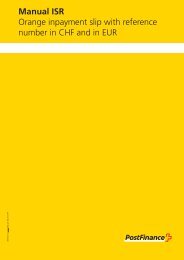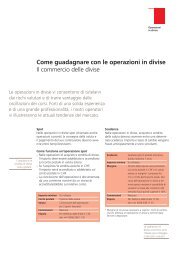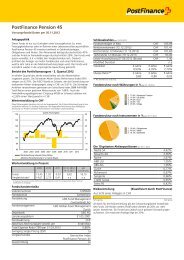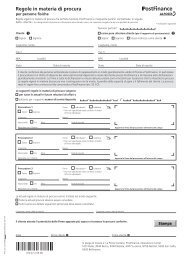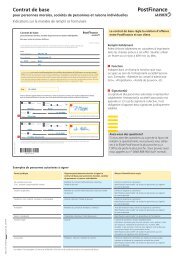You also want an ePaper? Increase the reach of your titles
YUMPU automatically turns print PDFs into web optimized ePapers that Google loves.
A NotProcessedInvoice entry indicates that the file could not be uploaded. The biller can tell which<br />
invoice is concerned by checking the TransactionID. The biller receives more detailed information in a<br />
separate processing log delivered daily.<br />
To comply with the WS-Security specification, requests always have a username token and a timeout.<br />
Further details below.<br />
3.1.1.2 The UploadFilesReport method<br />
The request for UploadFilesReport is similar to the method above. But in the response more detailed<br />
information about the transmission status of the files is given.<br />
The result is returned in the form of an array of type ProcessedInvoice with the following structure.<br />
public class ProcessedInvoice<br />
{<br />
public String FileType;<br />
public DateTime SubmitDate;<br />
public String TransactionID;<br />
public String ProcessingState;<br />
}<br />
This type of report entry corresponds to a daily report for each file type. The FileType may be one of the<br />
list above. The SubmitDate are date and time of the request and the TransactionID is the unique invoice<br />
ID supplied by the biller at upload. Processing contains the state of the submitted data. They may be<br />
"OK" or "NOK" by uploaded data. This information may be used for the download methods.<br />
3.1.2 Download Services<br />
The Download web service provides the biller with eight bill management methods. A distinction is made<br />
between outstanding bills, protocols and registrations (never downloaded) and archived data (already<br />
downloaded). It can be controlled by ArchiveData (true / false). Data already collected remain available<br />
for 40 days after the first download.<br />
3.1.2.1 GetInvoiceListWithIDs<br />
This method returns a report list of available bills with the most important details. It replaces the omitted<br />
method GetInvoiceList.<br />
The interfaces are as follows:<br />
InvoiceReportWithID[] GetInvoiceList( String BillerID, bool ArchiveData );<br />
The method expect the BillerID and the ArchiveData flag as parameters to be passed. To list already<br />
downloaded bills, the ArchiveData flag must be set to true.<br />
The result will be returned in an array of type InvoiceReportWithID with the following structure.<br />
public class InvoiceReportWithID<br />
{<br />
public String BillerID;<br />
public String TransactionID;<br />
public DateTime DeliveryDate;<br />
public String FileType;<br />
}<br />
This type of report contains the follwing details for each bill. The TransactionID is the unique invoice ID<br />
and the DeliveryDate is the invoice date supplied by the biller when uploading it. The FileType may be<br />
"RGXMLSIG"or "EDIFACT". Bills which are embedded as an appendix in a ybInvoice like the SAPiDoc are<br />
also of the FileType "RGXMLSIG". All this information may be used for the download methods.<br />
3.1.2.2 GetInvoiceByID<br />
This method allows to download a single signed invoice by its TransactionID. It replaces the omitted method<br />
GetInvoce. For obtaining the TransactionID, the GetInvoiceListWithID method has to be called first.<br />
DownloadFile GetInvoiceByID( String BillerID, string TransactionID );<br />
5/19





